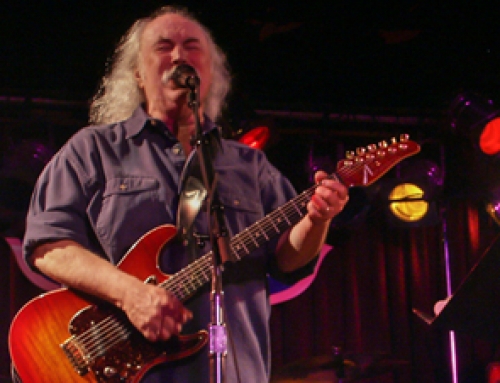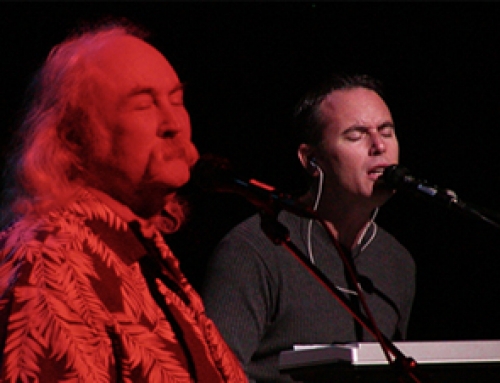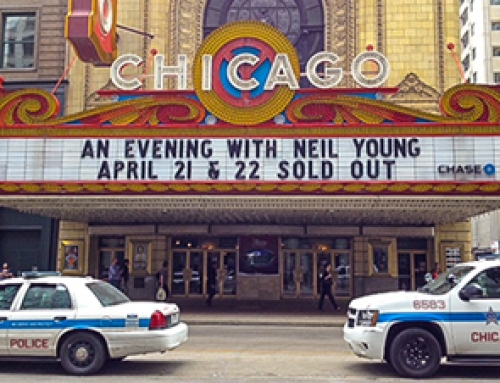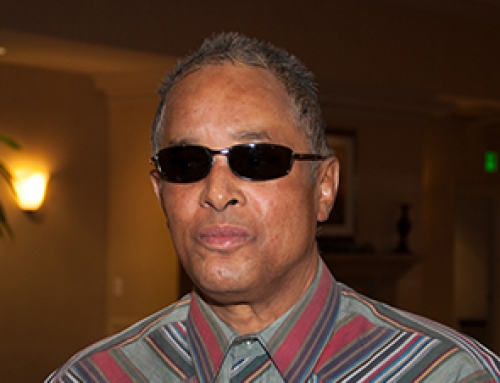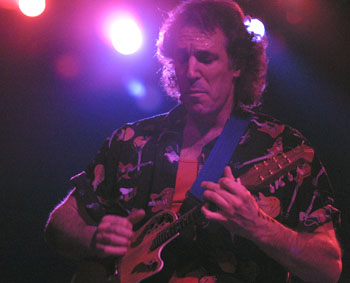
4waysite.com
Thanks to: Dave Zimmer and Paul Higham, as well as Tony Bittick, Joost Groen and Steve Levine
Photos: Alex, Tony Bittick, Henry Diltz, Gonzo, Les Kahn, Francesco Lucarelli, Buzz Person, Tim Owen, Stuart Feldman, Victoria Smith, Pam Springstein, Dolf van Stijgeren and by courtesy of Jeff Pevar
Date: October, 2007
Most people have probably heard Jeff Pevar even if they’ve not heard of him; and they may not even realize it.
A guitarist, composer, multi-instrumentalist, producer, arranger and vocalist, Pevar (a.k.a. “The Peev”) has recorded, performed and/or toured with some of the finest musicians in the music business, such as Ray Charles, James Taylor, Carly Simon, Rickie Lee Jones, Steely Dan’s Donald Fagen, Phil Lesh, Marc Cohn and many others.
Perhaps most notably: through being Marc Cohn’s guitarist on a tour supporting Crosby, Stills & Nash, he came into contact with the CSN “family”, which is, of course, of particular interest to readers of 4 WaySite. Since that first introduction in 1992 he has worked with Crosby & Nash (first on tour and later in the studio for the 2004 CD “Crosby & Nash”), with Crosby and his son James Raymond (both live and in the studio) as CPR, with Graham Nash live in 2002 and with CSN during their 2004 & 2005 tours.
The Peev has come a long way since being born and raised in Connecticut and – as he says – “trying to grow up” in Hartford, CT.
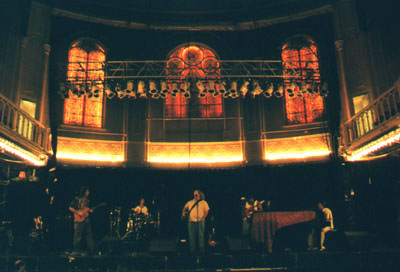 My first meeting with him was in 1998 prior to a CPR performance at the Paradiso, Amsterdam, in a venue that used to be a church and is right next to the house where my wealthy aunt Theodora Elisabeth used to live some 70 years ago! At one point we were outside, talking, and realized we were locked out! Our cries of “let us in!” gained us entrance again; I later realized it was the first time in my life I’d ever demanded entry to a church! Once we were back inside I started to recognize that The Peev is a very kind and modest human being and doesn’t conform to the image of the musician as an ego-inflated self-promoting windbag.
My first meeting with him was in 1998 prior to a CPR performance at the Paradiso, Amsterdam, in a venue that used to be a church and is right next to the house where my wealthy aunt Theodora Elisabeth used to live some 70 years ago! At one point we were outside, talking, and realized we were locked out! Our cries of “let us in!” gained us entrance again; I later realized it was the first time in my life I’d ever demanded entry to a church! Once we were back inside I started to recognize that The Peev is a very kind and modest human being and doesn’t conform to the image of the musician as an ego-inflated self-promoting windbag.
I knew I just had my first Pevarian experience and the show hadn’t even started yet…
ABOUT JEFF PEVAR
4WS: Jeff, before we talk about music, I would like to ask something about your name, as I believe names can give a clue as to where you (originally) come from. But yours presents some difficulty…
JP: As I understand it, my grandparents were part of the immigration from Europe to the US in the early 1900s out of Russia. I don’t really know if my descendants were actually Russians, as there was so much nomadic relocation going on. There was an organization called Hiafa that helped Jewish immigrants relocate from Europe to the US during that time. I have been led to believe that my grandparents left from the port of Odessa in Russia to get to the New World around 1915 or thereabouts.
4WS: I have never seen a relatively simple surname misspelled so often. You almost “beat” Michael Finnigan (often spelled as “Finnegan”) and my name in the misspelling sweepstakes! Where did the most embarrassing mistake take place?
JP: Well I think part of the “problem” is the unique name, and part of it was a nickname Crosby started calling me early on when we started working together. He called me “peev” and it kinda stuck, so I ended up using it as an online moniker and email addy. Over time the nickname caught on. The family name Pevar has the long e vowel in it, so one might think you would need to spell “peev” with two e’s if your going to spell it phonetically…. Using that spelling led to all kinds of misspellings along the way in addition to the fact that it’s just not a common name. When we were touring as CPR I was pleased to see all our CPR names advertised. To recall 2 nights in a row where my name was misspelled, as per your inquiry, the first was a huge marquee in Las Vegas when my name was misspelled “JEFF PAVAR” for weeks in advance of our gig… and then the following night in New Orleans is was spelled “JEFF PEVAK”…. ha ha…. at that point, well you just throw your hands in the air and you just have to laugh….
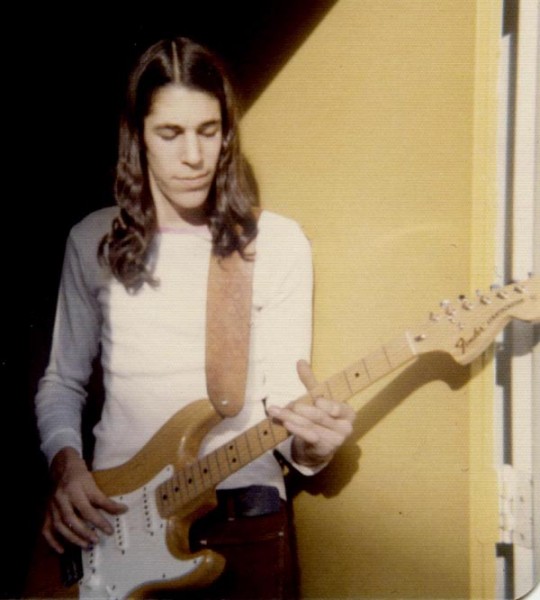 4WS: You once told interviewer Tom Guerra that a “so-called friend” did a Jimi Hendrix smashing act on your first electric guitar, but the guitar player you tried to emulate was… John Fogerty! Why John Fogerty and not – for example – Jimi Hendrix?!
4WS: You once told interviewer Tom Guerra that a “so-called friend” did a Jimi Hendrix smashing act on your first electric guitar, but the guitar player you tried to emulate was… John Fogerty! Why John Fogerty and not – for example – Jimi Hendrix?!
JP: Well the reason is I hadn’t heard Jimi yet! I was all of 10 years-old at the time I think.
4WS: You also said it was because of Fogerty’s “simplistic, gut-level pentatonic approach.” I am not an expert, but I wouldn’t call your style “simplistic”… How would you characterize it?
JP: Again, the question from that interview was referring to my initial interest in learning how to play guitar and Creedence was one of the first groups I listened to besides the Beatles. I am a self taught player so I am simply a product of what I listened to and what got me excited about music. The list is a mile long but some of the main influences are Jimi Hendrix, Jeff Beck, early Eric Clapton, Jimmy Page, Larry Carlton, Robben Ford, Ry Cooder, Alvin Lee….the list goes on and on.
4WS: In an interesting interview in 2002, conducted by Tony Bittick, you said you thank God everyday that music came into your life because you have a vehicle to try to express some of the anger, passion, love and inspiration that kind of runs through your veins. Since your are Jewish I wonder – being very interested in history – if that anger is related to the fact the Jews have suffered a long history of persecution; especially during World War II.
JP: There is a lot of sadness surrounding that, of course, but I’m not one to carry around a chip on my shoulder from that horrible piece of history. I would like to think that I am essentially an optimistic, caring person. Unfortunately my parents broke up when I was very young and my mom had a very tough time because of it. Without going into the personal details too much, her pain and frustration impacted my life profoundly. I am so thankful that music has become a source of so much purpose and healing in my life. It has been such a source of purpose to my being and when it brings anyone else joy or inspiration, then all the better. I gained a lot of purpose the day I realized that it’s not just about getting really good at what you do, but that it’s about what you do to serve others with the gifts we all have. That’s the real deal about being in this life, in my opinion.
4WS: In that same interview you said “There’s good music and bad music.” I know it is extremely difficult, but could you describe what, for you, makes music “good” or “bad”?
JP: I am attracted to what hits my gut, and interestingly that changes as the days go by, as there is some music I once loved that doesn’t really do it for me anymore. Tastes develop and change over time. I like music that is based on content more so than packaging. I also love improvisation. Music of the moment. Music with integrity and heart. Music with melody and lyricism. Music with a message. Music that paints pictures with sound… all the varied colors coming together and creating a sum that is greater than the individual parts. As it is one of the most powerful things in my life, music that resonates within my soul.
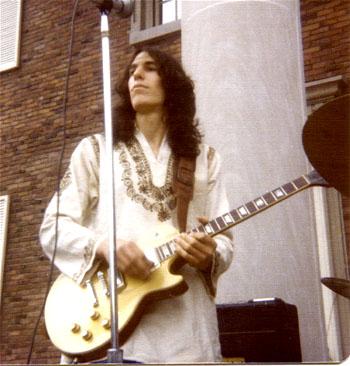 4WS: You are a self taught player, and have never taken any lessons. From whom would you like to take a few “lessons” if you had the chance, what would you like to learn?
4WS: You are a self taught player, and have never taken any lessons. From whom would you like to take a few “lessons” if you had the chance, what would you like to learn?
JP: Many of my most beneficial lessons have simply come from working with other musicians. One can learn all the notes on an instrument but if you don’t know how to apply them, what does that really do for you? So I am so thankful I have played with such an amazing cross section of musical styles and composers. Admittedly I am torn between becoming more adept on my instrument and studying with jazz masters but at the same time I would also enjoy working with some of the great popular composers like McCartney, Sting, Hornsby…
4WS: Is your ’64 white Fender Strat still your main guitar?
JP: I find myself going through phases with different guitars. I have guitars stored in numerous places because, well, I just keep acquiring them. I guess you could say that I have a great excuse to keep getting more of ‘em just because I can! I often award myself instruments depending on if it’s something I will use in the studio or something that just happens to come my way. You could say that I like to offer them a good home. ![]() Lately I have been playing my ’61 Fender Esquire and a late ’60s Cherry 335 a lot when I am home on the West Coast. When I am playing on the East Coast I have been playing my late ’60s 345 a lot. I have been enjoying using different guitars and different amps these days, as opposed to years ago when I was playing thru a lot of the same gear. I feel all the different setups bring out a different part of my musicality, and I enjoy that.
Lately I have been playing my ’61 Fender Esquire and a late ’60s Cherry 335 a lot when I am home on the West Coast. When I am playing on the East Coast I have been playing my late ’60s 345 a lot. I have been enjoying using different guitars and different amps these days, as opposed to years ago when I was playing thru a lot of the same gear. I feel all the different setups bring out a different part of my musicality, and I enjoy that.
4WS: On 25 November 2003 two of your guitars were stolen from a CPR show in Eureka, CA. Have you been able to track them down?
JP: Amazingly they were both recovered, I am happy to report. There are a number of people that I am very thankful to for going out of their way to help me recover these instruments who are living in that area. They ran articles in the local newspaper for us and the word got out. I bought my acoustic guitar back from someone who bought it from someone selling it on the street and then saw the article and called the police to ask if it was mine, and the electric guitar was recovered when someone brought it into a music store asking how much it was worth. Fortunately they had a picture of my stolen guitar at the music store behind the counter. The rest is history and I have them back. I am very grateful.
4WS: You are obviously quite a versatile guitarist and the choice of many artists, what is your favorite style?
JP: Anything that gives me room to express my heart through music. I love so many styles that it’s a hard thing to say I love this more than that, but, I do consider myself an improviser in spirit. Playing music of the moment rather than trying to recreate another moment…. having space to embellish music using the guitar as a vehicle to express passion and energy makes Jeff a very happy guy.
4WS: In that same interview with Tom Guerra you said, “I’m very self critical.” Do you think you’ve already recorded your “ultimate solo” and do you now think it’s actually possible to make music you simply could never improve on?
JP: I have learned since that interview that no solo could ever contain all there is to be said. At the same time everyday you are alive is energy that you can experience and express, and if music happens to be a vehicle for that then how lucky are we?! Everyday is the opportunity to play the ultimate solo of that day. So in essence I now think that there can never be an ultimate solo… but there can be some damn good ones! And that’s a great thing to go for!
4WS: Can you shed some fresh light on some of the different projects you are doing: Jazz Is Dead, Jeff Pevar, Inger Jorgensen & Bohemian Soul and the Jeff Pevar Group?
JP: I love playing great music period. I love the diversity that comes along with playing with a lot of different musicians. I love to tour, but I also enjoy not being on the road all the time playing the same songs. Each ensemble has a unique opportunity and I learn from all of them. Besides working on my own recordings I am also writing for other projects and producing other artists as well. I have a beautiful home in Oregon and I do a lot studio work there. Clients send me recording work I do at home, whereas I used to have to pack up all my stuff and travel to studios with all my guitars and amps. Now session work comes to my door and fortunately I have more work than I know how to handle. I am constantly working with different artists. I just got back from working with a French artist in Paris which was a lovely experience. I love traveling and playing music in a different country than my own. All in all, I consider myself very lucky to do what I do.
4WS: Yes, I heard you recently returned from some recording sessions in Paris. Can you elaborate on that a bit?
JP: I have done about a half dozen French records which stemmed from a performance in Paris with Marc Cohn in 1991, where a French producer named Vinvent Frerebeau, saw me play asked me to come back to Paris to work on a record for an artist named Thomas Fersen. Since then numerous other producers have also asked me to record there. I love working in Paris. It beats LA by a long shot.
4WS: First Jazz Is Dead. The band’s approach is to take the repertoire of the Grateful Dead and to interpret it in a jazz-fusion style. Do the fans come primarily from the “Jazz” or from the “Dead” camps?
JP: There is a new Jazz Is Dead record that we are in the process of mixing that will be released soon, including performances from some stellar guest artists. One of the interesting things about this band is it attracts fans from many different genres. I have been very involved with arranging, playing and producing the record. It will be interesting to see how it is received. It’s a beautiful album and I am very proud of it. We’re still not sure if we’re going to call it Jazz Is Dead or not and that’s been part of the delay of its release…. the politics, if you will. But it will see the light of day soon and I’m sure you’ll hear about it through the circles that promote these kinds of interviews.
4WS: How is the name a problem?
JP: It’s a long story but the JID [Jazz Is Dead] band concept and name came from someone who was a manager/booking agent who was never in the band. There might be some discrepancy who has legal rights to use the name so we have thought of changing it to make sure there isn’t any legal issues.
4WS: As for the Jeff Pevar Group, did you want to be a front man or is it a matter of necessity?
JP: I do all kinds of gigs where I front the band….. where I do solo performances… where I am guitar player for others who front the band. It’s all great practice. When I do my own gigs it varies. I do like having other vocalists as consider myself more of a guitarist than a vocalist, but others have been pushing me to sing more. It’s all good.
4WS: Besides Jazz Is Dead, are there recordings from these projects available?
JP: My own recording, Bohemian Soul and others are all being worked on and are in various stages of development. The Jazz Is Dead record is closest to being ready for release at this point…and I have been working in my own studio for years.
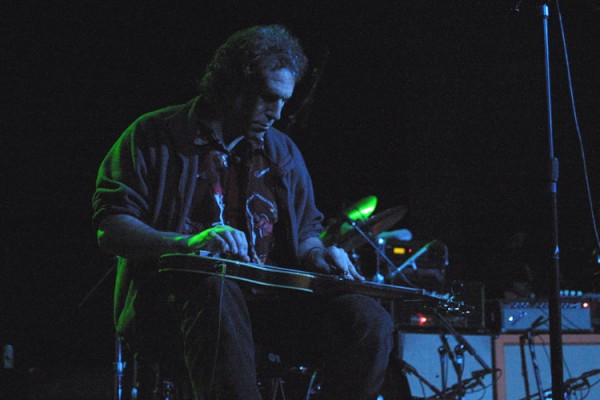
4WS: This summer, you were asked to come to the Berklee School of Music[1] with the Jazz Is Dead band, and teach a symposium on music. I heard it was very cool; can you tell about this?
JP: It was an honor. Two of the musicians from Jazz Is Dead have been teaching there so it was a natural. The kids were way into it. I sometimes feel a weight on my shoulder to try to rise to the occasion for something like this because I want to be able to inspire and convey what makes it all tick for me. I was quite happy with the way it turned out because during the interview I think I was able to convey some important info. One…. that no one in this world can play the note that you do… meaning, there are a million guitarists…some who play rings around me technically… but no one in the world can play the note I play with my heart and my life experience.. and that is something for all students and even all people to remember if you are ever doubting yourself. No one can deliver your message to the world. So when you stand in front the crowd at Cargenie Hall or even at the little club down the street, remember that every performance is Carnegie Hall…. as it is an opportunity to share your essence… whether there are 150,000 people there or 10 people to hear it, that’s the gift you were brought into this world to share.
4WS: Are you still your own manager?
JP: I have never taken on an actual manager. Fortunately work has always been there in one way or another. Since I have been a teenager I have made a living playing music and I am very grateful for that. Admittedly, I am sometimes doing work that is less inspiring then other work, but it’s much better than cleaning carpets or pumping gas… ha ha… which I did when I was a teenager…. I mean… how good can you get cleaning a rug??? At least playing music has an open ceiling in regards to how good you can get. I have thought about management in regards to if and when I am touring a product. But I am involved with so many types of things I just didn’t really go after the “solo artist” thing yet.
4WS: But how do opportunities come your way?
JP: Every which way…. I’d like to think that ultimately, we manifest our opportunities. The music biz is like other businesses when someone is good at what they do, word gets around, but there’s more to it than that. Being someone who is easy to work with, being accessible spiritually, all that stuff is helpful in getting gigs. But for me, offers come in all kinds of ways, and very often unexpectedly. In recent experience I am much more a believer that there is a much bigger force at hand that is in sync with one’s intention and maybe also ones karma. Recently the premise that we as humans possess much more power that we can even fathom in our ability to manifest what it is we need and want has shown itself to me. I have much more faith that life morphs into new chapters because it is important for growth. I am learning about all that every day of my life and I trust it.
4WS: What is your opinion of online discussion communities such as the Lee Shore and other blogs and music-related “lists” and “chat rooms?” Sometimes people make some fairly critical comments about musicians and the work they do online. Does this bother you?
JP: People are people and everyone has their opinions. It’s been quite some time since I have checked into these lists, as it was time for me to do other things. I do love the fact that so many people support CSN, C/N, CPR and I appreciate all the folks who have sent good energy my way because of the support I offered though my work and dedication to the various projects. There were many years that those projects became a huge priority to me and it was a great gift that I will always have with me. It wasn’t just a gig. These people are great people with big hearts and of course along with that is all the politics, egos and all the stuff that goes along with being in the music biz…. being seen and talked about, within and around the music. It’s important to not get caught up in the extraneous BS. Ultimately I feel enriched by it all. I am very proud of the work we all did together and especially that a lot of great music was created and that the recordings will always be there.
4WS: What are some new technology developments that you think have impacted music and your music, in particular, the most?
JP: The fact that I am able to make a living out of my own home using Pro Tools in my home studio is life changing. I used to be very concerned when a tour ended what I was going to do for reasonable income. I now am concerned I won’t be able to get to all the sessions I have waiting for me in the mailbox. It’s a lovely problem to have.
4WS: Obviously a luxury problem, but what is “Pro Tools?”
JP: Pro Tools is the industry standard for recording digital audio software. I use Pro Tools in my home studio which makes it possible for me to not have to travel so much. The sessions are sent to me via the mail or the internet. I perform and produce my session work and send them back to the artist. So it’s cheaper for an artist who wants to hire me because if they decide to work with me this way, they save the costs of flying me in, hotels and studio costs. I do the work for them at my own studio. Not to say that I don’t still enjoy some traveling when it happens, but when the budgets are smaller, it makes it possible for people to still afford my fees as I have the flexibility to try to work with those budgets because I am not away from my home.
4WS: You humbly call yourself “Jack of all trades, master of none.” Does this only apply to the music, or also to other skills, other interests and endeavors outside of music?
JP: One can’t call themselves a master and use a straight face… heh… heh… I feel like I am good at what I do, but admittedly, there are times when I pick up the guitar and say to myself, wow, Jeff, you don’t even know what the hell you are doing…. and it still sounds pretty damn good!!
CSN&Y
4WS: On different occasions you have said you consider CSN to be your teachers. Can you be more specific about what you have learned from them and who else do you consider your teachers?
JP: I am a self taught musician and all the music that I am attracted to is part of my influence and my embriodery. The Beatles were my first real teachers in regards to music that got me excited and inspired. CSN music offered other gateways to my understanding of the many possibilities that profound synergy that is created though music where the sum is even more profound than the individual parts. That’s one of the biggest lessons in ensemble music on this level. Music is such an incredible vehicle to convey energy, intention and message. There are myriad lessons I have learned from my experiences playing and touring with these people, musically, and otherwise. I quit high school to take on music as my full time life course. The lessons never stop. To list the things I have learned here would take pages. I have been honored to be a part it anytime we share music together.
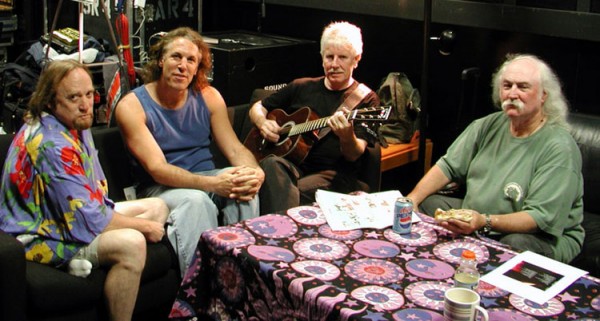
4WS: And I can’t resist asking this: what do you think they might have (individually if you want) learned from you..?
JP: That Jewish kids CAN really play guitar!
4WS: What is your favorite CSN&Y record?
JP: A tough question because there are so many beautiful songs… OK: “Déjà Vu.”
4WS: Why?
JP: I like the fact that they open up arrangements and take liberties with the solo instruments. Also some of my favorite songs are on that record. The intermingling of the electric guitars… I like guitar solos if you didn’t know!
4WS: I am surprised! But seriously, you met David Crosby when you were touring with singer/songwriter Marc Cohn [“Walking in Memphis”] in 1992. You attracted Crosby’s attention when you played “Triad” during a sound check. Why pick “Triad? ” Though a great song, it’s not one where a guitarist can really stretch out.
JP: Interesting I picked that tune as I think some of the most profound music I ever made with Crosby was with either in CPR or with Crosby and Nash when we toured as a trio. Hence the forethought of playing the tune “Triad” which talks about the strength of the triad or trio. But in reality it was simply the first tune of his I could think of his at the time.
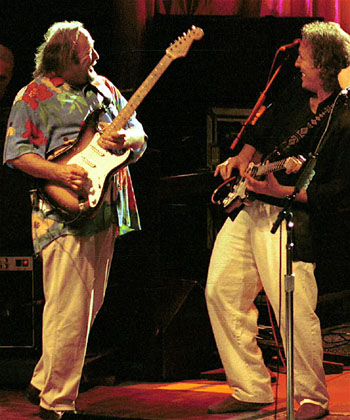 4WS: What do you recall about the first time you played with Stephen Stills. When was it?
4WS: What do you recall about the first time you played with Stephen Stills. When was it?
JP: The first time I really got to play with Stephen was when I was asked to tour with CSN [in 2005]. I suggested I get together with Stephen on his own turf to get to know one another before we got into the rehearsal room to become comfortable playing together. He invited me to come over to his house. We pulled out a couple guitars and jammed on a blues together and after we finished he looked up at me and screamed, “I didn’t know you could play like THAT”! Admittedly it was another one of those life experiences you might hope would happen one day, but I never was quite sure it would because of the situation with CSN and them usually not having another lead guitarist around…(unless you happened to be Neil Young). In my early days of learning lead guitar Stephen was definitely an influence. To be able to play something with him and watch his eyes get all wide and excited from something I did made me feel a sense of completion, as he did the same for me on so many occasions.
4WS: Now that you mention it, Stills also showed his appreciation on his latest album, “Man Alive!”: he name checked you in the “Thanks section.” How would you describe your relationship with him?
JP: In the early days of my working with CSN Stephen and I had some amazing talks and emails back and forth. I found Stephen to be very engaging and excited to be working together. I think he liked the fact that I could relate to him as a lead player and someone that he respected as a guitarist. I would like to think that it brought out that side of him that pushed the envelope even just a little more to do his best when he came up at bat. David came up to me one day after a CSN gig and he said to me. “I haven’t heard Stephen play like that in years! The only other person I have seen do that to Stephen is Neil. Whatever you are doing, keep on doing it”! What an honor. From the beginning I had wanted to be of service to their music, to do whatever I could to contribute to any of these varied ensembles. This was a high point in regards to the CSN legacy that came to me musically at such an early age and influence me as a young musician…that years later to be able to give something back. I feel blessed to have had the opportunity to work with CSN and be of any help or inspiration in any way. It was a great life experience.
4WS: In 2005 you toured with CSN in Europe. Did you get a Stills and Pevar thing going on the guitar à la Stills and Young? The dueling slides at the end of “Don’t Dig Here” certainly hinted that something similar was going on up there on the stage…
JP: In the end, it’s two guys who just love to play guitar playing off each other. When Stephen plays with Neil it’s just that. No one will be those two guitarists that play they way they do together, with the history they share together and all that. When Stills was open to doing some trade offs with me of course I was thrilled, because I have something to say. There were some amazing nights where we were smiling ear to ear trading back and forth. At a certain point it goes beyond the licks and who’s doing what because it’s just energy…. two people playing the shit out of their guitars and making people, including themselves, happy at the celebration of it all.
4WS: When with CPR you can stretch out on the guitar; did playing with CSN give you same freedom, or was your role different?
JP: I was in a much more supportive role in CSN because Stephen is the lead guitarist in that band. I played lead guitar in some spots too, but he’s Stephen Stills, ya know?! I was there to do whatever I could to support the music and I was honored to have some spots to do what I do in there depending on the night, the current arrangement and all that. I sometimes felt a little funny playing too much because I never wanted Stephen to feel like I was playing too much or that it felt uncomfortable for him in any way if I was being too featured as a lead guitarist. I am an accomplished guitarist but in the end, people came to see Stephen play his ass off, and when he does, there is no one like him. I was thrilled at the opportunity to be in that band and not only support the music but we were also playing a song I wrote with Nash (“Jesus of Rio”) every night. It was such a sweet experience in so many ways.
4WS: How would you describe the recording of “Jesus of Rio” with Nash?
JP: I am quite proud of it. It came together over time and it was a treat to work with Graham on such a heartfelt piece of music. I am thrilled it came out so beautifully. The fact that they decided to have James Taylor sing on it too??? Pinch me. I mean, what a band. Leland Sklar, Dean Parks, Russ Kunkel, James Raymond, Luis Conte and myself with Crosby, Nash and James Taylor on the same song? Thank you, Graham…. Thank you, David…. Thank you, God.
4WS: You’ve played with CSN collectively and individually. Could you describe the musical difference(s) between Crosby, Stills and Nash?
JP: The three of them are profound musicians with individual strengths and fortes. It’s like three of your favorite flavors all coming together on one plate in CSN. They each are profound artists in their own right and together is a beautiful synergy that creates a whole other thing.
4WS: Back to Graham. You recently appeared with him at the NAMM[2] show. How did this come about? And how was it playing with Nash again?
JP: I called Nash and told him I was going to NAMM and wanted to know if he was going to go so we could possibly meet. He told me to meet him at the Martin Guitar Booth at 1 pm on Saturday. I got there right around 1 PM and people were saying to me… “There you are, Graham has been waiting for you”! They threw a guitar in my hand and little did I know that Graham was unveiling the new Martin guitar CSN had dedicated to Gerry Tolman, Graham’s dear friend who passed away in a car crash [December 31, 2005]. We played “Teach your Children,” I believe. It was really sweet and I was really happy to be asked to be there in honor of Gerry. We all miss him. Playing music with Graham was like riding a bike on a spring day when you haven’t ridden all winter (I’m from Connecticut)… it felt fresh and so familiar. He is such a sweet heartfelt man.
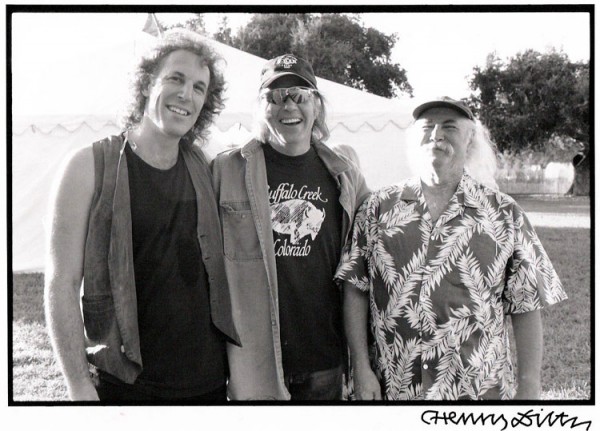 4WS: A question about the great song “Climber”: This song appeared on CPR’s “Just like Gravity” and later as a CSNY studio version (recorded in 1999) on Crosby’s box set “Voyage.” What do you think of that version and Neil Young’s – as mentioned in the liner notes of the box set – “edgy” guitar playing?
4WS: A question about the great song “Climber”: This song appeared on CPR’s “Just like Gravity” and later as a CSNY studio version (recorded in 1999) on Crosby’s box set “Voyage.” What do you think of that version and Neil Young’s – as mentioned in the liner notes of the box set – “edgy” guitar playing?
JP: I just heard it for the first time because of your question. Amazing rendition. Neil is much more than a guitarist. He paints pictures with sounds and words. The guy is incredible. I love his work and he always ups the ante to anything he’s involved with.
4WS: Have you ever played with Neil Young?
JP: I’ve played with Neil lots of times…. but he was on a record though and he wasn’t actually there playing with me at the same time…ha ha. No, we’ve never played together. I’m sure it would be fun, though if it ever happened.
4WS: How do you think your styles would mesh?
JP: Meshing? When you think about it there are only 12 notes. As long as you leave room for other musicians to mesh then it’s really easy to mesh with pretty much anyone, unless they don’t want to mesh with you.
CPR
4WS: CPR was Crosby’s (great!) idea, wasn’t it? When James Raymond appeared in 1996, writing and playing with his father, David Crosby, you and David already knew each other. But then you had to blend in with James Raymond. Can you tell me a little bit about that process?
JP: It was simple. All we did was play together and that was that. I think it was another one of those “meant to be” scenarios. The recordings of the music and the compatibility onstage showed that I think.
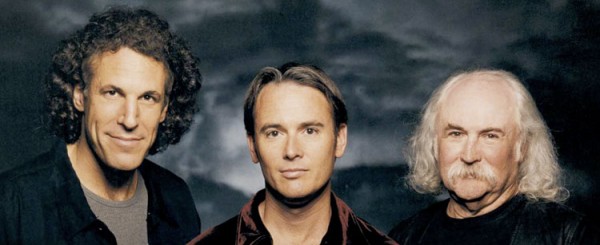
4WS: Absolutely! I have read quite a few interviews with all of the CPR members including Andrew Ford & Steve DiStanislao [bass and drums respectively]. I noticed you all talk so positively about each other (which is good of course), but don’t you also need some tension to play to the best of your abilities, or is this a myth?
JP: I don’t think that that is true that there needs to be tension for great music. There needs to be respect, inspiration, dedication and a kindred spirit. With everyone’s different lives and being out on the road with the day to day, inevitably there were tensions that arose…. but nothing that seemed to really get in the way of the music to where it couldn’t happen. Of course everyone had their own stuff and every band does, but when the music is that good, you put up with whatever you have to, to make the music happen. All in all, we all got along really well, I think. There had always been a lot of camaraderie surrounding the project. David made me feel quite integral when we were all playing together in CPR and he told me that many times, which I am grateful to him for. I think initially CPR was an opportunity for him to bond with James in a musical situation. I felt quite honored to be invited to be part of the reunion, but it ended up being much more to many of us.
4WS: On a side note: Steve DiStanislao toured last year with none less than David Gilmour [Pink Floyd]. Do you know David Gilmour and what do you think of his songwriting and guitar styles?
JP: I love his work…. across the board. He sings with his guitar and I absolutely love his voice and writing.
4WS: CPR’s sound has a strong jazz thread running through it. Is that the Jeff Pevar factor in the band or is the bass department [Andrew Ford] also responsible? Or maybe the keyboard section [James Raymond]? Oh wait, what about the percussion camp..?!
JP: What is jazz anyway? Is it a feeling? What makes a jazz noise? CPR had all sorts of elements. It pulled from all sorts of styles. One of the things that made CPR interesting, in my opinion, was the freedom to pull from all these various elements. Jazz also has a lot of dynamics so maybe that’s part of it. Jazz sometimes has chords that are dense (more than two or three notes), so maybe that’s part of it too. Jazz has improvisation….. we improvised…. Jazz a freedom in the essence of the music and CPR had a lot of that too. It was a great time for all of us. There were some amazing gigs and to see David take chances like that was something to behold. It made me very happy to see him pushing his boundaries like he did in that band.
4WS: Many CPR songs were collaborative efforts between the three (and later on “Just like Gravity,” sometimes even five) of you. Can you tell me about the process of writing and the role of each member?
JP: Every song was different. Some of the tunes were started by different members and then brought in for collaboration in various combinations. It’s been a while, so they each are unique.
4WS: One of my favorite CPR songs – “That House” – was written by you on Crosby’s boat The Mayan. How did his schooner inspire you?
JP: Well the acoustic guitar lick that happens on the intro was an idea that came to me but the song was a collaboration in regards to the rest. I was staying alone on David’s boat and sat on the deck one sunny afternoon and the lick just came out of the guitar I was holding…. which happened to be David’s guitar. I can’t really say whether the idea was mine or David’s guitar…ha ha… but the lick sounds like sitting on David’s boat to me.
4WS: Steve DiStanislao was 17-years-old when he first met James Raymond, and Andrew Ford was a writing partner and also a very old friend of James Raymond’s before CPR. Given this history, can you give some insight into why the first CPR album did not feature Steve DiStanislao and Andrew Ford?
JP: You are mistaken. Stevie plays on a number of the tunes on the first record. I know that he played on “Morrison” and “At the Edge” too, because I played fretless bass on that one with him on the rhythm track. But at the time we were only a trio and hadn’t done any gigs with a rhythm section, so that’s why there were a number of drummers/percussionists on the record. We had only played live as a trio (the live “CPR @ Cuesta College” record was around that time).
4WS: And Andrew Ford got also involved through James, right?
JP: Yes
4WS: What are a couple of your favorite CPR “moments” in the studio and on the road?
JP: Playing the Montreux Jazz Festival…. getting Crosby to tell me he liked my fretless bass track on “At the Edge” after telling me to put the bass down before I played it…… having Marc Cohn, Graham Nash and Phil Collins sit in with us at the Wiltern Theatre and having it all on a live record…… watching Crosby laugh anytime.
4WS: I know there are a few CPR “unreleased outtakes,” such as “American Ghost Town” – a song what you really rocked out on live. What are the chances that any of those will ever be released?
JP: If memory serves me correctly, we never recorded it, we just played it live. A great song.
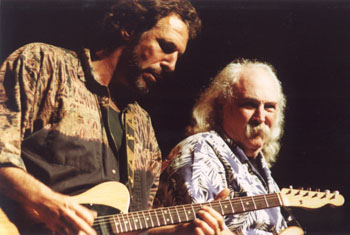 4WS: On many occasions, Crosby has called you the best guitarist he ever played with. I don’t want to pick over any bad memories, but in 2004 you were “replaced” by Dean Parks [who co-wrote two songs and played guitar for “Crosby & Nash”] on the Crosby & Nash tour of Europe. If my memory serves me well you were a bit surprised. How do you feel about it now?
4WS: On many occasions, Crosby has called you the best guitarist he ever played with. I don’t want to pick over any bad memories, but in 2004 you were “replaced” by Dean Parks [who co-wrote two songs and played guitar for “Crosby & Nash”] on the Crosby & Nash tour of Europe. If my memory serves me well you were a bit surprised. How do you feel about it now?
JP: I don’t look at it as being replaced, as Dean is a masterful guitarist in his own right and he offers any musical outing his own unique brand of musical prowess. I realized in hindsight that this was a gift for all concerned. It is very important for all of us to always be moving forward with our musical endeavors and sometimes things get a little too comfortable and we need to shake things up a bit and try new stuff. Dean has been friends with these guys a long time and what a beautiful musician to have out there to support David and Graham. It has ended up being a blessing for me in many ways. When they were out on tour all these other great experiences were coming my way that I would have missed, almost like there was a bigger force having a hand in it all. I am in such gratitude with all the amazing things that have come my way in my life. Playing with musicians like Donald Fagen, Ray Charles, CSN, James Taylor, Marc Cohn, Billy Cobham, Phil Lesh, Joe Cocker. The thing was with David and Graham we all had so much fun together it just lasted a lot longer than I ever expected….and so, who knows what might happen down the line. There is still a lot of love and respect there, I believe.
4WS: On which songs of the latest Crosby & Nash CD did you play?
JP: At this point it’s a bit of a blur because it was years ago. If memory serves me correctly I played on a lot of the tunes but some tracks that I did were used and others not. Whatever playing of mine they chose for the record, I am very proud of, and again, just to be a part of it at all is a gift. At a certain point you offer up your positive energy to the project and then the rest if it is out of your hands. Ultimately it’s all about how the final product feels. I think that it’s a beautiful record and I’m thrilled to have the 1st song that I ever wrote with Graham on it. As an added bonus they got James Taylor, who I had the pleasure of working with in the ’80s, to sing on it, which was an extra thrill.
4WS: Any chance of you putting in an appearance at a C&N show on the current tour?
JP: I ended up getting too busy in the studio to get out to see them.
4WS: In Crosby’s book “Since Then,” you said you and Crosby had “a huge talk” one time [During the latest CPR tour on 6 March 2004] in New Jersey. Do you recall what that conversation was about?
JP: I do and it had to do with some stuff I needed to iron out with David. We had a great heartfelt conversation and I left feeling very appreciated by him.
4WS: It was, as we learned later, the day he left his gun and marijuana in his hotel room. How did the arrest and the disruption impact CPR?
JP: I felt horrible for him. After all he had been through, but as the bumper sticker says, “Shit happens.” David is like a cat. He always lands on his feet. I assume he learned some important lessons and moved forward.
4WS: In that same book Crosby comments to the effect that he thinks his work with CPR is some of his best. I cannot agree more, but what do you think is the reason CPR never really broke through commercially? CPR did CNN, Jay Leno, Montreux, toured extensively in the US and Europe, and yet it was still not enough…
JP: What is success? Making great music to me. The biz is the biz, which often has nothing to do with that. We’re not 20 posing with our chests hanging out. It’s an older aged band making music that isn’t exactly radio top 40. To me, CPR was successful because it toured and recorded great music.
4WS: In February this year you said on your message board “I have no plans to work with them” [CPR]. The Trillion-Dollar Question: does CPR need CardioPulmonary Resuscitation[3] and who, if anyone, is likely to administer it?
JP: I have no idea what the future of CPR is. In one sense it might have been a lovely time that came and went, or it might be a book that might be reopened somewhere down the line. It remains to be seen and I am a happy guy whatever is meant to be.
4WS: Then I put it this way: what would have to happen for CPR to record and perform together again?
JP: CPR was Crosby’s idea and incarnation. He’s the one to make it happen if it is to happen again. It was a huge gift to my life and I’m a happy guy with whatever is to be, as a sweet moment of the past or if some new life is brought into it. We’ll just have to wait and see.
EPILOGUE
4WS: Which musicians are still on your wish list to play with?
JP: All the ones I haven’t played with yet.
4WS: A standard 4waysite.com question: what is in your CD/MP3 player or iPod now?
JP: My iPod has four days of music on it. Today I listened to Bela Fleck because I played an impromptu duet at a party with his bassist Victor Wooten the other night here in Oregon. What a treat.
4WS: What would you do if you could not, for whatever reason, play the guitar anymore?
JP: Cry uncontrollably.
4WS: This one I asked CSNY writer and insider Dave Zimmer (in an exclusive interview) and I would like to pose this question to you too: If time-travel were possible, would Laurel Canyon[4] circa 1969, be high on your list of destinations?
JP: No. Because I would have only been nine-years-old and waaaay too young to do all the crazy things that were going on there back then. Also, I am a huge fan of time moving forward because we can’t relive the past. There was a reason why the people that were there during that time were there and I have no interest in living someone else’s reality. I am quite happy living my own.
4WS: Not to get into anything too personal, but what can you tell me about your girlfriend Inger Jorgensen? She seems to be quite an artist…
JP: She’s an amazing woman and incredibly talented. Meeting her brought me to the state I am now living in at the perfect time in my life to undertake such a change of scene. Like it was just meant to be. I have gotten to a place in my life where I trust these kinds of things. Almost like life flows in the exact place it’s supposed to be when you don’t get in the way. I have never been happier.
4WS: Back to the future and my final question: what’s your current motivation, your next goal?
JP: Finish his interview so I can get into bed!
Thanks for your support and interest. My life has been so enriched with all of these amazing things that have happened. I used to think that it was all just coincidence, all these great things happening, but as time has gone on I believe that we all have important work to do in this life and we flow into these opportunities as they are here for us. We choose them and they choose us.
We manifest them and they manifest us. It’s one of the fascinating things about this life. I plan to make great music for as long as I am breathing, so thank you for your continued support because I know there is some amazing things to come.
My love and gratitude to you all.
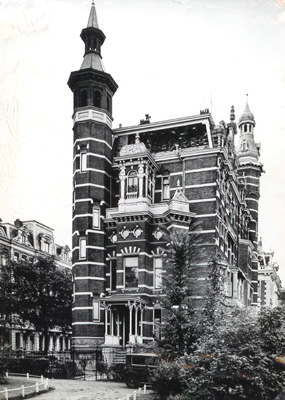 Jeff’s “neighbor” Aunt Theodora Elisabeth’s house in 1932. |
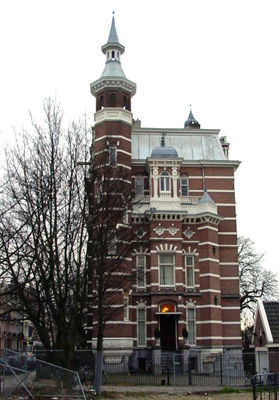 The same house in 2005. Photo was taken just before a C&N show. |
Note from Dolf van Stijgeren: “I consider myself very lucky to have experienced the CPR magic several times, but the Paradiso, Amsterdam in 1998, still ranks as one of my favorite rock concerts of all time. And I had the bonus of a pre-show Pevarian experience. I am sure my late aunt Theodora Elisabeth would not have complained about the noisy neighbors…”
